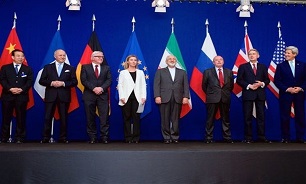Over 90 Nuclear Scientists Urge US Congress to Preserve JCPOA
 "Congress should act to ensure that the United States
remains a party to the agreement,” read the letter, signed by what amounted to
a who’s who of prominent physicists and other luminaries in American science,
The New York Times reported on Monday.
"Congress should act to ensure that the United States
remains a party to the agreement,” read the letter, signed by what amounted to
a who’s who of prominent physicists and other luminaries in American science,
The New York Times reported on Monday.
The letter said the signers were offering their perspective "as scientists who understand the physics and technology of nuclear power, of nuclear explosives, and of long-range missiles; and who collectively bring their experience with nuclear nonproliferation.”
They included Richard L. Garwin, a 2016 Presidential Medal of Freedom recipient and nonproliferation advocate, whose work at the Los Alamos National Laboratory in the early 1950s gave birth to the hydrogen bomb; all three winners of the 2017 Nobel Prize in Physics; and Siegfried S. Hecker, a former director of Los Alamos who is internationally regarded as an authority on nuclear security threats.
Trump has described the 2015 agreement, negotiated under the Obama administration, as a giveaway to Iran and "one of the worst” deals ever, and has said it should be renegotiated or disbanded.
European allies of the United States that are parties to the nuclear agreement, also known as the Joint Comprehensive Plan of Action (JCPOA), have urged the Trump administration to respect it. Iran has said the accord cannot be renegotiated.
The scientists said Trump’s objections could be addressed without a renegotiation, which their letter called an "unrealistic objective.”
Their letter reflected the intense lobbying underway in Congress by supporters and opponents of the agreement, which lifted anti-Tehran sanctions in return for its peaceful nuclear activities.
The scientists emphasized that under the accord, severe restrictions on Iran’s supply of uranium remain in place through 2030, surveillance of Iran’s uranium-enriching centrifuges remains through 2035, and surveillance of uranium mines and mills through 2040.
The scientists’ letter also recommended additional ways to monitor Iran — or any other non-nuclear state, for that matter — without renouncing the nuclear agreement.
They proposed stronger verification at uranium enrichment plants in non-nuclear states, in addition to multinational control of such plants, which could "provide an extra layer of security against their misuse to produce material for nuclear weapons.”
The Iran agreement, the scientists said, is "necessary to provide the time needed to develop and implement these initiatives.”
Iran and the Group 5+1 (Russia, China, the US, Britain, France and Germany) reached the 159-page nuclear agreement in July 2015 and implemented it in January 2016.
Since the historic deal was signed in Vienna, the IAEA has repeatedly confirmed the Islamic Republic’s compliance with its commitments under the JCPOA, but some other parties, especially the US, have failed to live up to their undertakings.
